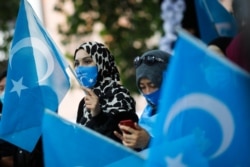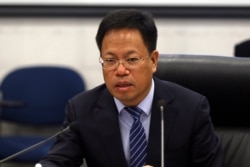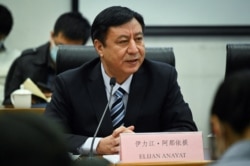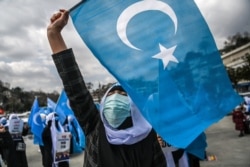Uyghur and Kazakh women activists who have been at the forefront of international criticism of Beijing’s repressive policies in Xinjiang say they are not backing down after Chinese officials publicly smeared their character to try to discredit them.
Several women have become outspoken activists in exile, telling international media that they endured rape, torture, forced sterilization and indoctrination by Chinese authorities in internment camps.
In recent weeks, China’s officials have accused them of having affairs and sexually transmitted diseases and committing loan fraud as evidence of bad character. The effort to disprove the women’s accounts comes as Beijing faces growing international pressure over its four-year crackdown against the Turkic ethnic groups.
But some of the women say the criticism has only emboldened them to speak out more about these abuses.
“It is unbelievable that in order to invalidate my accounts of rape, torture and forced sterilization, Chinese officials said I was infertile,” said Tursunay Ziyawudun, 42, a Uyghur camp survivor.
Ziyawudun was allowed by the Chinese government to travel for only one month to Kazakhstan to stay with her husband in September 2019 after she had been released from an internment camp in Xinjiang. She moved to the U.S. state of Virginia a year later. She told VOA that her uterus had to be removed after arriving in the U.S. because of sustained injury from abuses in Xinjiang.
“On four different occasions, I was taken to an interrogation room, where I was beaten. My private part was electrocuted unbearably by an electric baton and I was gang-raped,” Ziyawudun told VOA, adding that some of her fellow female detainees never came back to the cell after their visit to the interrogation room, and those who did return were told to keep quiet.
Beijing has publicly called the Uyghur women activists “liars” and “actors” fabricating “fake news” on Xinjiang.
On February 18, Xu Guixiang, the deputy director-general of the Publicity Department of Xinjiang, called Ziyawudun’s accusations “sheer nonsense.” At a press conference in Beijing, Xu portrayed Ziyawudun as a tool of China’s enemies and made allegations concerning her marriage history and supposed divorce over infertility.
“After leaving the country, in order to gain the refugee status, she was willing to be the 'actress' and manipulated by anti-China forces,” Xu told reporters.
Some China observers and rights activists say they are not surprised that China’s Communist Party (CCP) is attacking the character of its critics. They say the CCP continues to prevent independent, outside groups from investigating claims of abuse made by Uyghurs and others.
“These accusations often are accompanied by other ad hominem attacks. All of these are efforts to diminish criticisms of the CCP overseas,” said Anastasia Lin, a senior fellow at the Canada-based Raoul Wallenberg Human Rights Center.
At the same press conference in Beijing last month, Elijan Anayat, a spokesperson for the Xinjiang regional government, attacked Gulbahar Haitwaji, another Uyghur activist who has accused China of torture and inhumane cruelty against Uyghurs stemming from her two years in the country’s re-education camps.
“When she lived in China, she had affairs with other people and was exposed by her neighbor.” Anayat told the news conference. He further questioned Haitwaji’s integrity and accused her of membership in a “terrorist organization” — the World Uyghur Congress, an exile group based in London whose leaders have testified before the U.S. Congress and the United Nations.
Haitwaji, 55, a mother of two, currently lives in France and recounted details of her detention in internment camps from 2017 to 2019 in a book, "Survivor of the Chinese Gulag.” Haitwaji said she was chained to her bed for 20 days and witnessed similar inhumane treatment against other Uyghur women by camp officials in Karamay, a northern city in Xinjiang.
“I told truthfully what I have witnessed in the camps in the book, and now unable to invalidate my accounts, they [Chinese officials] come after me with baseless character attacks,” Haitwaji said last month in the interview with Radio Free Asia while strongly rejecting Anayat’s attacks.
Zumret Dawut, 38, is yet another Uyghur woman smeared by Beijing. Chinese officials have characterized her as someone with “inferior character,” while denying that she was sterilized or was ever held in internment camps.
“Everyone knows about her,” Xu said last month in Beijing, “she’s lazy and likes comfort. Her private life is chaotic, and her neighbors say that she committed adultery while in China.”
Dawut told VOA that Xu’s attacks were baseless and proved her activism has helped further expose China’s stringent policies in Xinjiang. She said she was kept in an internment camp in Urumqi in 2018 for more than two months until her Pakistani husband secured her release. Camp authorities, according to her, forced her and 200 other Uyghur women to undergo sterilization surgery in late 2018 at Urumqi county hospital.
“I had spoken facts about rights abuses against me and my people in East Turkestan. That is why China is trying to silence me with character attacks,” Dawut said, adding that she would continue telling about Beijing’s abuses in East Turkestan, a preferred term used by Uyghurs for Xinjiang.
Tim Grose, an assistant professor of China studies at Rose-Hulman Institute of Technology in Terre Haute, Indiana, said it was unlikely that the tactic by Chinese diplomats and state-media against these women can distract international attention from reports of human rights violations in Xinjiang.
“This tactic tries to deflect attention from the serious allegations and seeks to sow doubt,” Grose told VOA, adding that the CCP has used a similar strategy to also go after researchers and media outlets considered anti-China.
Zubayra Shamseden, Chinese Outreach Coordinator at the Washington-based Uyghur Human Rights Project, said the accusations show the women have been influential in providing information on Xinjiang despite China’s effort to isolate it.
Going after activists’ private lives and publicly shaming them has become a norm in crackdowns to silence Uyghur witnesses, Shamseden told VOA.
“Those women witnesses' testimonies truly hit the hot spot of what China is trying to hide from the world: slow but firm genocide of Uyghurs,” she told VOA.








